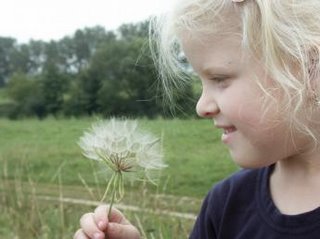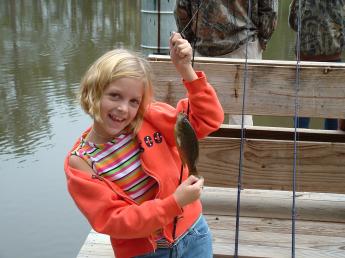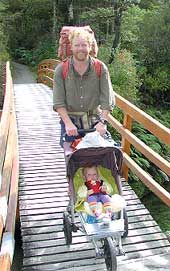|
|
|
|
||||||||||||||||||||||||||||||||||||||||||||||||||||||||
NWF Green Hour |
||||
Commentary on what parents should know about and can do to counteract common "nature deficit disorders" in our TV-watching, video game-playing children including encouraging a daily "Green Hour" of outside play and learning. A program of the National Wildlife Federation Friday, March 16, 2007 We're moving to GREENHOUR.ORG! We're moving to GREENHOUR.ORG!It's been over a year now since I began this blog to discuss “nature deficit disorder” and its effects on the current generation of children. We've talked about the increased incidence of ADHD and childhood obesity, compromised immune systems, and a host of other risks associated with the increased time today’s children are spending staring at electronic screens. Now, it’s time to get practical with some simple solutions you and your family can make a part of your everyday lives. Please join the National Wildlife Federation on our new website, www.greenhour.org. Here you will find information, tools and inspiration for parents and other caring adults. Rich in family-friendly content, the website hosts a supportive virtual community where you can learn, explore and share your outdoor experiences and backyard adventures. With this entry, the Green Hour Blog will officially move to this new website. Please visit -- and be sure to subscribe to our new RSS feed to receive blog updates in your browser or feed reader! Twice a month in this blog, I will present information and ideas on "nature deficit," its long-term effects on kids, and -- most importantly -- how a Green Hour program can help. Weekly, the website will describe many things parents and other adults can do to help kids get out more and connect to nature and to themselves. We hope that you will join us in making the Green Hour a part of your family's lifestyle and sign-up to be a member of the Green Hour Community. Labels: Green Hour, Nature Deficit Thursday, September 07, 2006 Academic Drugging: Parents Need To Think "Hills" Not "Pills." With evidence that more time outdoors playing in natural spaces can help ease the symptoms of Attention Deficit Hyperactivity Disorder (ADHD), it is disturbing that many parents are engaged in increasing amounts of academic drugging. The practice is on the rise and it is being motivated by parent's wanting higher acdemic achievement in their kids. Read more. Also check out this University of Illinois study on the positive effects of green space on ADHD problems in kids. Sunday, July 30, 2006 Study finds Green Hours good for the heart This means more than just having a warmer attitude toward nature. It actually means a stronger cardiovascular system. The Norwegian School of Sports Science in Oslo recently reported that children should be getting more like 90 minutes per day of physical activity to avoid "clustering of heart disease risk factors." Importantly, the study finds that children's casual activity, such as they would get by unstructured play outside, is critically important and may be the missing ingredient in long term heart health. Read more!  Rural kids have Nature Deficit Too The idea that urban kids are the only ones experiencing modern nature deficit is dead wrong according to the observations of writer Todd Wilkinson. He concludes that the video game phenomenon and the wired kids strikes rural youth too and takes some important things away from them. They, for instance, can lose touch with the sharper senses they might develop outdoors and might have sore thumbs from playing computer games but are as likely to be afraid of putting a worm on a fishing hook. Check out his article on taking some kids outdoors in Southeastern Montana. Read more! Thursday, June 29, 2006 Study Finds that Kid's Unstructured Time is Down 50% The organization, Playing for Keeps, (discussed earlier in this blog) is a strong proponent of the concept of "constructive play." They define constructive play" as safe, wholesome and non-violent activity tyhat helps kids develop skills and positive relationships and inspired them to be creative and to learn more about themselves and the world around them. Playing for Keeps has assembled some compelling facts that are worth repeating about what is really happening to children in our electronic world. Consider: * Unstructured outdoor activities declined by 50 percent compared to the previous generation. * More than 80 percent of children under age 2 and more than 60 percent ages 2-5 do not have access to daily outdoor play. * The average American home with a toddler has the TV on six hours a day. * The average 2-year-old spends more than four hours a day in front of a TV or computer screen. * One in six 2-year-olds has a TV in his or her bedroom. Learn more about the work and aspirations of Playing for Keeps  Videos Preferred Over Actual Visits to National Parks The phenomenon of people preferring sedentary, electronically-based, activities to more active pursuits now has a name according to some researchers -- "videophilia." In a June 21 Reuters story, a Nature Conservancy commissioned study to be published soon in the Journal of Environmental Management found that 98% of the national decline in park visitation in recent years is due to video games, movie video rentals, going to the movie theatre,, computers, television exacerbated by a shift toward higher fuel prices. The study concludes that this trend has serious negative implications for long-term environmental stewardship. We can also immediatley see how bad it will be for human health. Read more! Sunday, May 14, 2006 Fishing Moms? We know about soccer moms, but what about fishing moms? A group of mothers in Ventura County California, decided it was time to take their sons and daugthers fishing in nearby Lake Casitas. In an activity traditionally assigned to men, more and more mothers are getting involved. Nearly one fourth of today's kids are being raised by single moms and, hopefully, more of them will be paying attention to the growing problem of nature deficit in their children. Read More!  New Legislative Proposal to Fight Nature Deficit in California California SB 1649 is a new legislative proposal by Senator Richard Alarcon to permanently establish and fund a statewide outdoor education program to be funded through the license plate fund. It was sparked by efforts of the Sierra Club and others in the State to show how important it is for students, particularly those from under-resourced backgrounds, to engage in outdoor learning. Read More!  The Coming Recess Revolution School systems everywhere have been cutting back on free time for children in order to focus on preparing them for mandatory statewide tests. One of the casualties of this trend has been outdoor recess. Now, the federal government is also responding to the growing obesity epidemic with new reuirements for comprehensive wellness programs. These new programs will focus on improved nutrition in school meals, physical education and reduction of soda sales and other fattening snacks. It is vital, though, that kids have an opportunity to get outside and exercise while at school. Outdoor activity needs to be part of a rounded wellness prgoram including the return of recess. Read More!  Rapidly Advancing Nature Deficit in the Very Young The non-profit organization, Playing for Keeps, has completed a survey that finds that unstructured outdoor play is down 50% in children ages 2-5 over a generation ago. Importantly, the very young are most affected. More than 80% of children under 2 and 60% of children under 5 no longer have access to outside play. The average American home with a toddler has the TV on for six hours and the average 2 year old watches TV or plays on a computer 4 hours per day. Read more! Sunday, April 23, 2006 Childhood Outdoor Time: Essential for Adult Conservation Commitment A National Wildlife Week Special Children who fish, camp and spend time in the wild before age 11 are much more likely to grow up to be environmentally-minded and commtted as adults, a new study finds. Cornell Professor, Nancy Wells, and Kristi Lekies, a research associate in human development also at Cornell, recently analyzed data from the U.S. Forest Service that explored childhood nature experiences and adult environmentalism. The Cornell researchers used a sample of more than 2,000 adults, ages 18 to 90, who were living in urban areas and who responded to questions about their early childhood nature experiences and their current adult attitudes and behaviors relating to the environment. Their findings will be published in Children, Youth and Environments (Vol. 16:1). From the Cornell Press release: "Our study indicates that participating in wild nature activities before age 11 is a particularly potent pathway toward shaping both environmental attitudes and behaviors in adulthood," said Wells, whose previous studies have found that nature around a home can help protect children against life stress and boost children's cognitive functioning. When children become truly engaged with the natural world at a young age, the experience is likely to stay with them in a powerful way -- shaping their subsequent environmental path," she added. Read More!  Bring Back Outdoor Recess to Our Schools A National Wildlife Week Special A standing joke among people everywhere is their favorite subject when they were in school was recess! Today, they might be out of luck. The National Association for the Education of Young Children and others are concerned that recess time is being eliminated from elementary schools in school districts nationwide due to a perception it is a waste of time, takes away from academics, and portends physical injuries for children. The recess experience lets children learn through movement, relate to their peers in group settings, relieve tension, increase te ability to concentrate, help prevent obesity and related phyical problems. The bottom line: bring back recess and make it a part of a daily Green Hour program. Read More!  One Program's Open Letter to Parents About Outdoor Time A National Wildlife Week Special Teaching Strategies Inc. of Washington DC, has developed The Creative Curriculum for Early Childhood. Among other aspects it focuses on the importance of outdoot play in creating happy and health young children. In an open letter to parents they explain the importance of outdoor time as follows: "When we take the children outdoors at school, we talk about the things we can see, hear, touch, and feel so that the children become aware of changes in the weather and the seasons, the growth of plants, and animals. We help the children notice changes by asking them what is different about the trees, the caterpillars, or the sky. They lie on the ground and look up, or they climb the jungle gym and look down. We point out the many kinds of birds that fly overhead, butterflies, mosquitos, milkweed seeds, falling leaves, and rain as it begins. We wonder aloud where all these things come from." Read More!  A Look at the Emerging Field of Conservation Psychology National Wildlife Week Special Researcher, educator, and movement-builder, Dr. Carol Saunders, of the Brookfield Zoo in Chicago is certain that the nature and wildlife conservation field needs to embrace the social sciecnes more directly and effectively. The world will need a populace that both understands conservation and has a true affection for nature. Her recommendation is the emerging study of Conservation Psychology. She and a growing number of colleagues from across the nation are developing more focused research and testing prgorams that support greater understanding of what makes people conservation-minded and what will impact their behavior. To read more about her work and that of her colleagues, see her paper in Human Ecology Review (Photo: Chicago Wilderness) Saturday, April 01, 2006 Green Lining for the ADHD Black Box? There is huge public debate about whether “black box” side-effect warnings should go on ADHD drug labels. Keeping our children healthy, happy, peaceful and productive may, first and foremost, require a much more serious look at how they are spending their time. They are indoors more than any previous generation. Ask any adult about their childhood outdoor experiences and they will tell you about endless hours spent running through backyards, front yards, tree-line streets, neighborhoods, local parks or local woods. But things are much different now. No direct relationship between the amount of time kids spend staring at electronic screens and an increase in ADHD symptoms has ever been established by scientists. But, when we think of how 2.5 million children are now using medications to reduce symptoms, there may be a “greener” part of the solution. In 2004, researchers at the University of Illinois found that “exposure to ordinary natural settings in the course of common after-school and weekend activities may be widely effective in reducing attention deficit symptoms in children.” Co-authors Frances E. Kuo and Andrea Faber Taylor recommend that children with attention deficit hyperactive disorder (ADHD) spend some quality after-school hours and weekend time outdoors enjoying nature. See Article: ADHD Curbed When Kids Play Outdoors Photo from ADHD Information Library  No Child Left Inside Hope for Needed New Policies In a play on the name of current federal education policy, Connecticut Governor, Jodi Rell, has announced a new state park and recreation initiative to help children. It is called "No Child Left Inside" and is designed to reconnect kids with the outdoors through the state's parks and forests. Connecticut is among a growing number of states that recognize the need for getting children away from computers, videa games and TV's. In a recent press statement: "We're trying to reconnect with the outside," said Governor Rell. "We want kids to reconnect, to see the outside, to see what it's really like, not just from the house to the school bus. Not just down the street to a friend's house, but the real outdoors." One of the parks to showcase the effort will be Dinosaur State Park. They will be getting more educational specialists. Read More!  Outdoor Play: Remember it? Peggy O'Crowley, writing for the Newhouse News Service wrote an interesting article on some of the human dimensions of nature deficit. Though she didn't quite get my name right, (I have cousins named Coyne), and she didn't quite get the name of the National Wildlife Federation right (many good reporters have tread this path before her), she must be loudly commended for writing about this important change in American life and for asking some of the vital questions about what life without outdoor kids would be. Read More!  Parents: How About a Little Backbone? (For Your Kids) The phenomenon (some might call it "epidemic") of children spending over six hours per day indoors staring at electronic screens is disturbing at many levels. But parents everywhere will need to step up if they want their children to have the same levels of health they did in their younger (and older) years. In light of recent changes in children's behavior, the prestigious American Academy of Pediatrics now recommends that doctors evaluate children for the amount of calcium they're ingesting and encourage them to exercise more. The AAP reports: "National data show that most U.S. children over age eight now are at risk for the bone-thinning disease osteoporosis later in life because they lack calcium in sufficient amounts. The report's co-author says these are the major reasons: children drink sodas instead of milk or calcium-fortified juice; they're spending more time on TV, computers and video games, instead of exercising; and many schools have phased out organized physical activities." Read More! |
||||
|
|
||||||||||||||||||||||||||||||||
|
|
|
|
|||||||||||||||||||||||||||||||